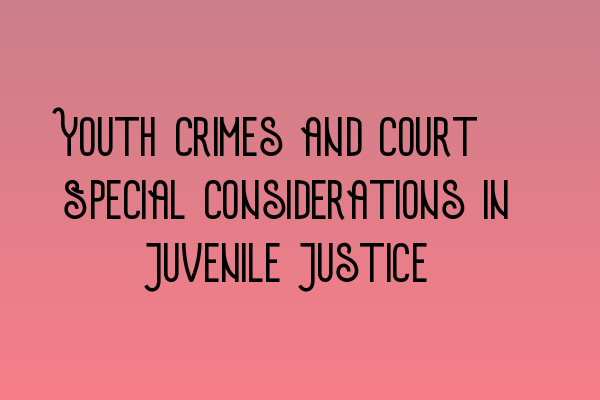Youth Crimes and Court: Special Considerations in Juvenile Justice
In the realm of criminal law, it is essential to understand the unique aspects of dealing with youth crimes and the court system. Juvenile justice requires special considerations, as minors require the utmost care and attention when they become involved in the criminal justice system. This blog post will explore key factors and considerations specific to youth crimes and court proceedings.
The Importance of a Juvenile Justice System
When it comes to youth crimes, it is crucial to recognize that young individuals often lack the mental and emotional maturity of adults. The purpose of a separate juvenile justice system is to provide young offenders with the guidance and support they need to rehabilitate and reintegrate into society successfully. The system aims to prioritize their welfare and future potential while holding them accountable for their actions.
To start this transformative process, it is imperative to ensure that young offenders are provided with age-appropriate legal representation. Solicitors who specialize in juvenile law understand the unique needs and concerns of young clients and can navigate the legal complexities on their behalf.
Special Considerations in Juvenile Court Proceedings
Juvenile court proceedings differ significantly from adult criminal court proceedings. The following are some of the special considerations in juvenile court:
Confidentiality:
Juvenile court records are treated with greater confidentiality compared to adult criminal records. This confidentiality is crucial to protect the privacy and future prospects of young offenders who have made mistakes but deserve a chance at redemption. The general rule is that juvenile court records are sealed once the individual turns 18 or after a specific period, depending on the jurisdiction. This ensures that their youthful offenses do not hinder their opportunities for education and employment.
Rehabilitation:
The primary focus of the juvenile justice system is rehabilitation rather than punishment. Youth offenders are given the opportunity to receive education, counseling, and support services that address the underlying causes of their delinquency. By addressing these root causes, the system aims to reduce the likelihood of reoffending and enable young individuals to lead productive lives.
Judicial Discretion:
Juvenile court judges have more flexibility in determining appropriate dispositions for youth offenders. They can tailor their decisions to suit each individual’s circumstances rather than adhering strictly to predetermined sentencing guidelines. Factors such as the offender’s age, background, and potential for rehabilitation are considered when determining the most suitable response to their offense.
Supporting Young Offenders
It is essential to provide adequate support and resources to young offenders once they have gone through the court system. Post-court interventions can include mentoring programs, educational assistance, vocational training, and community-based services aimed at reducing recidivism rates. By addressing the underlying factors contributing to youth crimes and offering the necessary support, the chances of successful reintegration into society increase significantly.
In conclusion, the juvenile justice system functions differently from the adult criminal justice system due to the unique needs and circumstances of young offenders. Special considerations such as confidentiality, focus on rehabilitation, and judicial discretion play a significant role in juvenile court proceedings. It is crucial for solicitors and legal professionals in this field to understand these special considerations and provide the necessary guidance and support to young individuals.
For more information on related topics, please check out the following articles:
